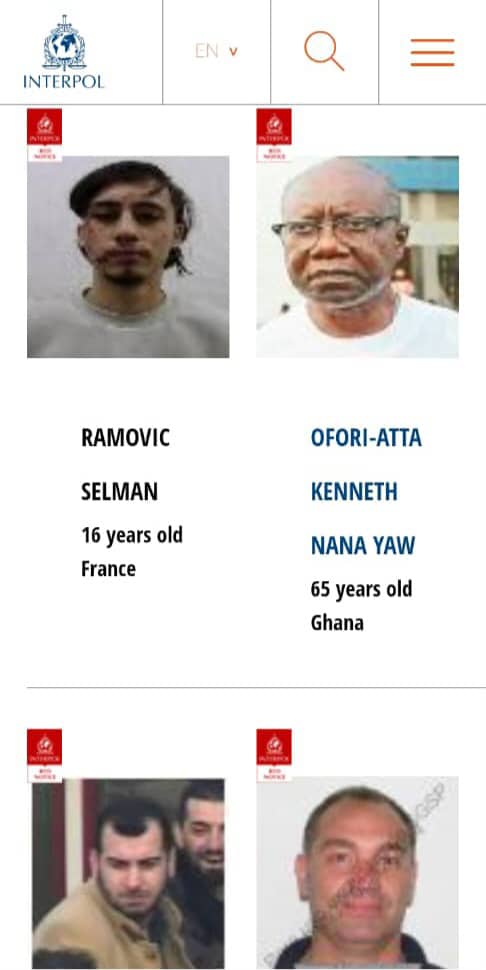In an unprecedented development in Ghana’s political and legal history, Ken Ofori-Atta, the former Minister of Finance, has been listed on the Interpol Red Notice database, effectively placing his name and image among the most wanted individuals worldwide. The Red Notice was issued upon the request of Ghana’s Office of the Special Prosecutor (OSP), citing Mr. Ofori-Atta’s alleged involvement in a series of corruption-related offences during his tenure as head of the Finance Ministry.
The publication of his photograph and details on Interpol’s publicly accessible Red Notice portal signals not just a significant moment in the investigation into governmental corruption in Ghana but also a marked shift in how African states, particularly Ghana, are willing to leverage international law enforcement mechanisms to ensure accountability, irrespective of the rank or social stature of the individuals involved.
Mr. Ofori-Atta, once a central figure in the administration of President Nana Addo Dankwa Akufo-Addo, has been under scrutiny for several years over alleged misappropriation of public funds, conflict of interest in the management of financial instruments, and questionable dealings surrounding key national initiatives. These include the financing of the controversial National Cathedral project, alleged irregularities in the issuance of sovereign bonds, and the management of public-private partnerships in the energy and health sectors.
The OSP first summoned Mr. Ofori-Atta earlier in 2025 for questioning, as part of an expansive anti-corruption probe that seeks to establish the extent of financial misgovernance in high-level government transactions. His failure to honour multiple summonses led to his being declared a fugitive in February. Although this status was briefly rescinded following assurances of cooperation and medical evidence provided by his legal counsel, it was reinstated on June 2, 2025, after his continued failure to appear before investigators.
A Red Notice from Interpol is not an international arrest warrant in itself; rather, it serves as a request to law enforcement agencies worldwide to locate and provisionally arrest an individual pending extradition, surrender, or similar legal action. However, the symbolic and operational implications of a Red Notice are profound, particularly when the subject is a high-profile political figure from a democratic state.
The decision to make Mr. Ofori-Atta’s listing public, complete with his photograph, personal details, and the charges levied against him, marks a bold step by the OSP. It not only internationalizes the legal proceedings but also ensures transparency, informing the public and international partners alike of Ghana’s seriousness in pursuing justice.

Critics of the move have raised concerns over the public nature of the listing, arguing that it may compromise the element of surprise and allow the accused to evade arrest more effectively. Nonetheless, proponents maintain that public accountability is a crucial element in reinforcing public trust in state institutions and deterring future abuse of office.
The issuance of the Red Notice triggers complex legal processes, particularly regarding extradition. It places a responsibility on the state in which Mr. Ofori-Atta is currently residing, speculated to be one of several countries, including the United States, the United Kingdom, or South Africa, to determine whether to comply with the notice, subject to their national laws and extradition treaties with Ghana.
Moreover, the listing intensifies the legal battle that is likely to ensue in both Ghanaian and foreign courts. Mr. Ofori-Atta’s legal representatives have argued that his absence from the OSP’s proceedings is due to medical treatment abroad, with supporting documents reportedly issued by medical facilities such as the Mayo Clinic. However, the OSP has deemed the evidence insufficient, arguing that it lacks credibility and fails to justify its complete non-cooperation with judicial procedures. If arrested and extradited, Mr. Ofori-Atta would face trial in Ghana, potentially becoming the most senior former government official to be prosecuted under the country’s current anti-corruption framework. This case represents a watershed in Ghana’s anti-corruption efforts and a test of the country’s legal institutions, which have long been perceived as lacking the capacity or political will to prosecute elite corruption. For the administration of President John Dramani Mahama, under whose leadership the OSP has grown more assertive, this development is likely to be seen as a validation of campaign promises to strengthen institutions and restore integrity in public office.
Nonetheless, the case also raises critical questions about due process, political neutrality, and the potential for misuse of international legal instruments in domestic political rivalries. The Special Prosecutor’s office must ensure that the investigation and any subsequent prosecution are conducted with the utmost transparency, legal rigour, and respect for Mr. Ofori-Atta’s fundamental rights. Ken Ofori-Atta’s inclusion on Interpol’s Red Notice list is emblematic of a new era in Ghanaian politics, where accountability may finally begin to transcend the boundaries of office and influence. Whether this listing leads to a successful extradition and prosecution remains uncertain, but its symbolic power is indisputable. It sends a clear message: no one is above the law.
As Ghana navigates this complex legal terrain, it must do so with a commitment to justice, fairness, and the rule of law principles that form the cornerstone of any functional democracy. The world is watching, and the outcome of this case may well shape the trajectory of anti-corruption enforcement across the continent.

